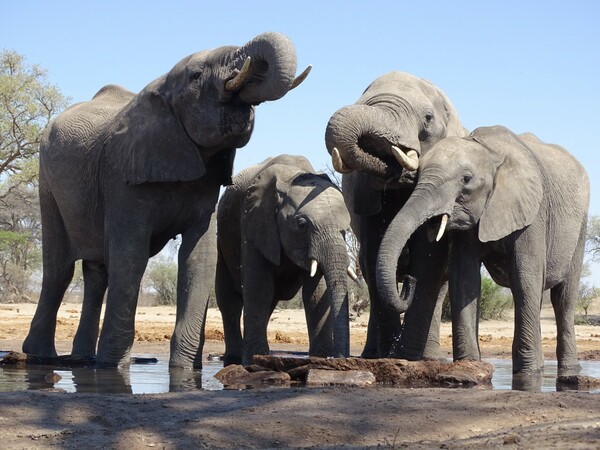Last week’s conference, organized by Zimparks, Zimbabwe’s wildlife management authority, was attended by representatives of Botswana, Namibia, South Africa, Tanzania and Zambia.
During the meeting, Zimbabwe was primarily trying to find backing for a one-off sale of its stockpile of seized ivory, worth approximately US$600 million. The country is planning to present the idea at the Conference of Parties to the Convention on International Trade in Endangered Species (CITES) which is to be held in Panama later this year.
“Our proposal was understood,” Tinashe Farawo, public relations officer at Zimparks, told the OCCRP on Monday, referring to last week’s meeting. “We agreed to follow science and speak with one voice on the question.”
Despite a continued decline of elephant populations around Africa because of poaching, conservation measures in Zimbabwe have been remarkably effective.
With a population of more than 100,000 elephants, which is growing rapidly and already amounts to nearly one fourth of all elephants on the continent, the country is facing a somewhat unusual problem of elephant overpopulation.
According to conservationists, the capacity of elephant reserves has been exceeded more than twice.
During the dry season, elephant herds, searching for food, invade surrounding farming areas, sometimes devouring the entire harvest. Zimparks said that as of 2019, farmers had lost more than 7,000 hectares of crops to straying elephants.
Last year, the resulting human-wildlife conflict led to an all-time high of 72 deaths.
Zimbabwe claims that it has resorted to searching for alternative sources of funding because it can no longer afford to manage its elephant population.
“The money raised from the ivory sales would be used to support elephant conservation and affected communities,” explained Farawo.
A part of the funds would specifically go into relocating some of the elephants to countries that are trying to restore their elephant populations.
Since 1991, Zimbabwe has been selling elephant hunting permits, capped at 500 per year. Farawo implied that under ideal circumstances, Zimbabwe would appreciate achieving an arrangement that would go beyond a one-off sale and allow for regular sales of ivory extracted from the hunted elephants.
“This would, of course, go a long way,” he said.
The efforts have faced international condemnation.
“The summit is sending a dangerous signal to poachers and criminal syndicates that elephants are mere commodities, and that ivory trade could be resumed, heightening the threat to the species,” said a joint statement by 50 leading biodiversity organizations.
The international ivory trade has been banned since 1989 under the CITES Convention.
Nevertheless, in 1999 and 2008, CITES authorized one-off ivory sales, earning US$5 and 15 million respectively, which were subsequently invested into conservation.
The joint statement claims that the sales “resulted in a sharp escalation in the illegal killing and poaching of elephants across Africa.”
There appears to be no empirical evidence supporting the claim, however.
In fact, the first sale coincided with a decrease in the ivory trade, according to the analysis of seizure data by CITES.
Although there was an increase in the trade following the second sale, it remains unclear whether this was indeed its consequence or simply a result of an increased supply that had already been underway.
“It is unfortunate,” reacted Farawo to the backlash. “Most of these people, speaking from their air-conditioned offices in Europe, have never seen an elephant in their entire life, never had to compete for land and water with the wildlife. They are using emotions and are politicizing the issue.”
According to Farawo, it should be up to Zimbabwe to decide how to manage its elephant population.
“There is enough evidence that we are doing a good job,” he concluded.

